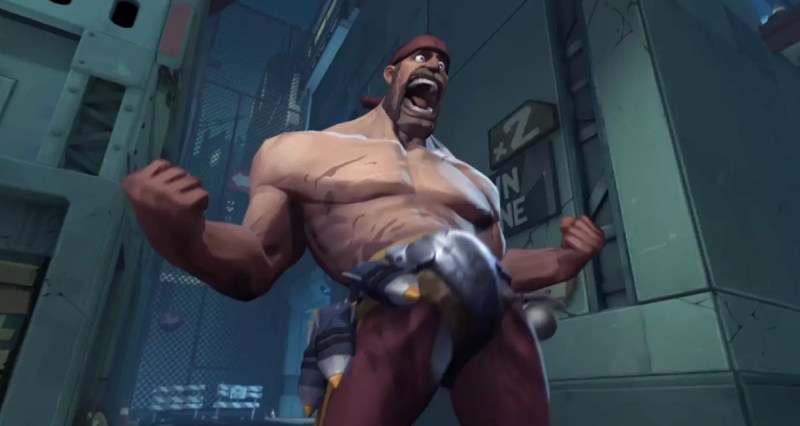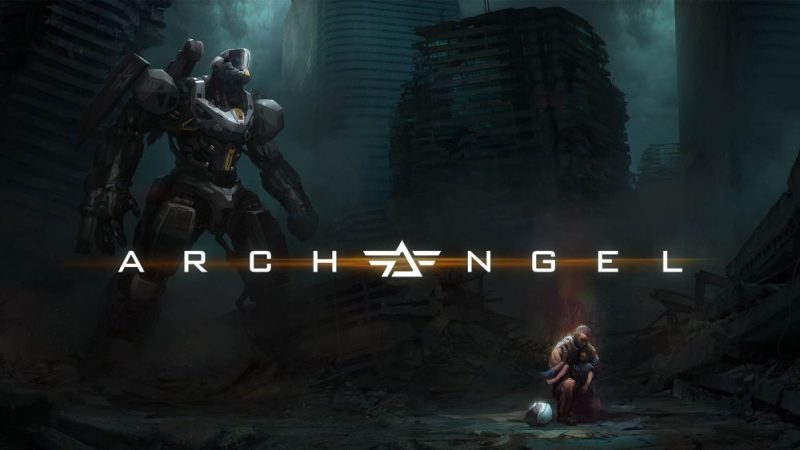Hollywood and games are making friends again. You can see it at Hollywood companies such as Warner Bros., NBCU, Annapurna, and now Skydance Interactive.
Skydance debuted in 2010, and it’s founder is David Ellison, son of Oracle’s Larry Ellison. It has made movies such as True Grit, Mission: Impossible: Ghost Protocol, G.I. Joe, Star Trek: Into Darkness, World War Z, and Terminator: Genisys.
It also acquired a game studio called The Workshop, and it now has 90 employees working on games. Every few years, the pendulum on games and Hollywood swings back and forth. In the past year, Disney retreated from making its own mobile games and returned to licensing its properties to outside game companies.
The first two games Skydance is showing are Archangel, a futuristic mech combat game in virtual reality; and PWND, a satirical 3-versus-3 multiplayer shooter game where the goal is to shoot and then embarrass your opponents.
The man behind these games is Peter Akemann, the CEO of game division Skydance Interactive and former president of The Workshop. I played both games at a recent preview event and talked to Akemann about both the nuances of the games and what it means to create an ambitious new game business.
Here’s an edited transcript of our interview.

Above: Peter Akemann, CEO of Skydance Interactive.
GamesBeat: How long have you been at it as Skydance?
Akemann: Skydance Interactive was formed just over a year ago, last April.
GamesBeat: But PWND had an existence before that?
Akemann: PWND was cooking for many years before that. I don’t even want to tell you how long. It was almost in the origin days of The Workshop itself, coming out of our initial period of invention and discovery. We had prototyped the rocket jumping. We got that working with some other things that didn’t pan out. But somewhere in there we came up with a wild-hair idea for the PWND mechanic. What if you had to teabag to score?
The novel thing has two parts. It’s the scoring by pwn, but also removing the scoring by kill. It’s knocking a pillar out of the foundation of every shooter in the world. Kill to score is not our game. That was the daring move that changed it. Then we realized how rocket jumping and pwning together. Pwning alone, we’ve seen other games try to do that, like Offensive Combat.
GamesBeat: It reminds me of Kill Confirmed in Call of Duty.
Akemann: Right. These are interesting things, nice bonus mechanics, but they’re not fundamental game mechanics. They can’t be. You move at a certain speed. Your weapons move at a certain speed. You have hit skins and the way the levels are designed. But for us, it’s exactly the ability to have a highly three-dimensional arena where, with rocket-jumping, you can have plenty of game space, but no point is really all that far from any other.
In two dimensions that’s not really possible. If you want a lot of space, things are far away. In three dimensions you have a lot more to work with. The rocket-jumping enables that three-dimensional closure, and it makes it possible for the pwn mechanics to be necessary. If I snipe some guy across a big, wide, two-dimensional plane and I gotta walk over there to score, forget it. PWND, however, boom, boom, rocket jump, I’m there in four seconds, three if I’m good, two and a half if I’m really good. It’s a good thing, because the timer is only three seconds. Can I close that pwn in time? Mastery of the movement, mastery of the arena, learning the lines where the rocket jumps are.
When we first created this, we did it for a console controller. We were targeting Xbox Live, to give you an idea of how long ago this was. But mechanics that could support that—we felt we had a whole shooter audience that had grown up with shooters being console experiences. Can we bring that high speed PC action to a console audience? That was the first thing that got it started.

Above: PWND is about shooting your friends and then “pwning” them, or making lewd gestures while standing over them.
GamesBeat: It’s different from Halo controls. I have to relearn how to jump.
Akemann: It’s our adaptation. But we’d done console action gaming for a decade at that point. “We know something about this. We can crack this.” I was ignorant of how hard it is, but then you have to be, or you’d never try to do the impossible.
GamesBeat: If you leave something out, it seems like you’re forgetting—I was always forgetting to carry a body.
Akemann: You can carry, yeah. You don’t have to, but it can be a good tactical decision. If some guy’s in the wrong position, where he’s a bit exposed, that can make all the difference. You start the pwn where you’re sticking out from behind a wall and a sniper from across the arena is going to get you. But you drag him into the alley you get it done. But you slow the time down when you pick the person up. Everyone’s taking risks. Everything’s a tradeoff.
GamesBeat: It seems at least slightly offensive. Did you worry about that at all?
Akemann: Sure, of course we did. We wanted to provoke, but not offend? We had this crazy satirical humor to the thing from the outset. Given what we’re doing, it’s hard to avoid. But we’ve been sensitive about not making it a game that was offensive, that was openly vulgar. It’s puerile, but not overtly gross in a sexual way, or any other way for that matter. We didn’t want to turn people off. It’s a fine line, right? There’s getting people’s ire up, and then there’s just grossing them out to a point where they don’t want to be there. Certain other games, and I shouldn’t go with a litany of them, have crossed the line in ways that I think were to their detriment.

Above: Archangel is Skydance Interactive’s debut VR game.
GamesBeat: So that was a design goal? Let’s not cross that line.
Akemann: Right. Let’s make a satirical game. We always felt that the game was kind of subversive, in the beginning. It’s knocking out death as the pillar, taking away one of the fundamental mechanics in video games. Killing stuff for points, right? We have that line about how death is temporary, but humiliation is forever. That echoed our vibe. It set the tone for an irreverent and satirical game. Irreverent on a certain level, anyway. On another level it takes itself very seriously. But the humor is unmistakable. That’s the line you have to ride if you’re going to go with satire.
GamesBeat: And trash-talking became a core value of the game.
Akemann: Trash-talking, we wanted to kind of make it okay. Yes, there’s a Jerry Springer Show mentality to the whole thing, without a doubt. But at the same time, it’s fun. It’s not toxic. We’ll see, when we get it into the real ecosystem. Any online system can become toxic. But by legitimizing the trash talk and making it a part of the fun, it can be just as fun to take a rocket launcher to the face – to take it as it is to dish it out. If you get pwnd five times and finally get back at that guy who’s been sticking it to you the whole match. Or if you’re saved by your buddy who’s a stronger player than you.
One of the great things about it is the way teams with members of varying skill can support each other. I know the emotion of it. When I’m getting pwnd by somebody and I see him take a rocket to the face half a second before he was going to win, I feel great! He gets what’s coming to him. There’s lots of turnover. Turnover is kind of a theme. A lot of payback throughout the game, all the way across. All those little emotional loops really work. They keep the game fun.
GamesBeat: How did you ultimately get to the 3-on-3 structure? Did you have bigger teams at any point?
Akemann: We never went very large, maybe because we were never a very big company? We never had enough guys to play something like 16-on-16. Once we had those mechanics early on, we found that it was so much about knowing all of what’s going on with the other team. The moment a player is down, I want to know where my friends are, where my enemies are. Are they engaged? Are they down? How quickly are they going to be able to get to me? With lots of other players you don’t know that. That tactical game is lost.
You could still have a great free-for-all time with a large number. If you play five on five it’s the jungle. Some guys just love it. They love the chaos. The core rocket jumping game is so fun. Pulling off any pwn at all in that environment feels like an achievement.

